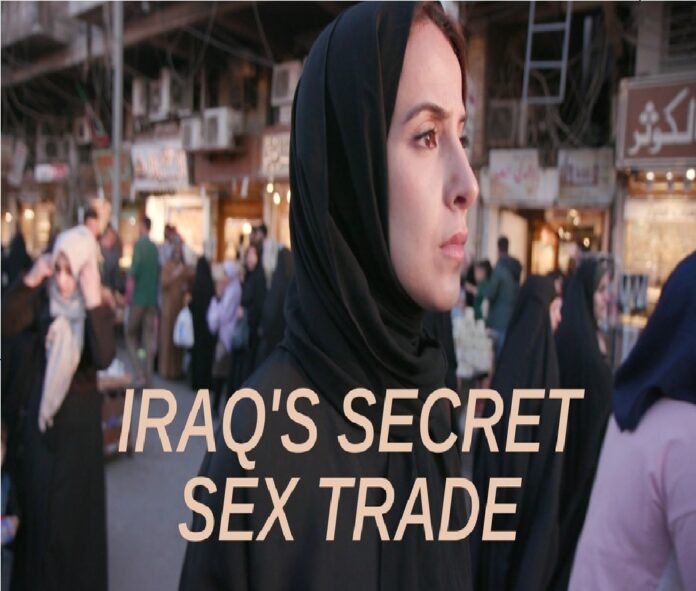Religious “pleasure marriages” in Iraq serve as a cover for child prostitution.
I’m entering Kadhimiyah, one of the holiest locations in Shia Islam, by passing over the security fence. I’m in line with a large group of pilgrims who have traveled from all over the world to see the mausoleum of Imam Kadhim. The female security guard at the gate pats me down and peers into my handbag as a warning that the story I’m covering here won’t be simple.
As I stroll past the market booths lining the shrine, I am aware of the numerous “marriage offices” scattered all over the mosque that are authorized to officiate in Sharia marriages. I’d heard rumors that some clergy in this city were facilitating short-term mutaa [pleasure] marriages, a practice that is against Iraqi law and in which a man can pay for a temporary bride in exchange for the cleric officiating the marriage taking a cut.
I was informed that many of these clerics were utilizing and misusing Sharia marriage regulations to profitably exploit women behind closed doors. With what appeared to be complete impunity, these individuals were pimping out and grooming young girls and vulnerable women.
We had to get proof on camera for such a narrative. Over the course of our research, which lasted a year, we hired a male undercover reporter who met and discreetly videotaped a number of the clerics overseeing the Sharia marriage offices close to the shrines. In the meantime, I met and spoke with some of the male clients who frequently used pleasure marriages, as well as the female victims of the clerics.
To determine how many clergy in Baghdad who had marriage offices were willing to conduct mutaa ceremonies, our undercover reporter first approached a number of them. Eight of the ten clerics who were contacted and asked to help our reporter arrange a pleasure marriage did so. One of the clerics, Sayyed Raad, said to our reporter on tape, “You can marry a girl for half an hour and as soon as it’s over, you can marry another,” repeating, “even after half an hour, you can marry another.”
We also obtained video evidence that corroborated some of the victims’ allegations that priests frequently worked together with their male clients to defraud women. When preparing a pleasure marriage, the clergyman instructed our reporter in a Kadamiya marriage office, who was posing as a visiting businessman: “Take my advice, don’t tell her where my offices are in Kadamiya, so afterwards she can’t come searching for her rights. It’s better that way, I assure you.
Teenage females were particularly susceptible to predatory men backed by clergy, and they frequently paid the highest price for their misfortune, according to our research. In Iraq, it is usually considered a scandal and a stain on the family’s honor for a young lady to lose her virginity before marriage. These girls frequently experience family rejection and disapproval. The girls are sometimes slain.
Sayyed Raad offered to perform a pleasure marriage for our reporter and “a young virgin” in Kadamiya. He told him that “anal sex is permitted” and cautioned him against stealing her virginity while they were together. Our reporter asked, “If I do, God forbid, take her virginity, what do I do?” “Does [her family] know where you live?” Asking, Sayyed Raad. They don’t, our reporter said, “No, they don’t.” The cleric stated, “Then you can just leave.”
Reem claimed a cleric sold her to three other men after grooming her.
It was challenging to watch the hidden tape, especially since I was interviewing numerous young ladies who were dealing with the repercussions of the priests’ conduct. When an older man began escorting one of them, Mona, home from school, she was just 14 years old. “He told me I was beautiful, he was rich, and he loved my personality.” A few weeks later, the man pushed her into a pleasure marriage by introducing her to a clergyman.
Mona told me, “I told [the cleric] I was a virgin,” but he didn’t ask her parents’ permission, as is customary in Iraq, claiming that it wasn’t necessary since both she and the man were adults. Her family is pressuring her to be married at the age of 17, but she is afraid her future husband will find out that she is no longer a virgin. She claims that her uncle killed her cousin because she had a boyfriend. She is still considering suicide at this time. I have no other option. I’ll act if there is more pressure.
The investigation brought me to Karbala, the holiest place in Shia Islam. Establishing the involvement of the religious authorities in the holy city in all of this, particularly if they approved of the practice of pleasure weddings, was a crucial component of our inquiry. I spoke with Sheikh Emad Alassady at the main marriage office, who said the practice was forbidden.
However, we discovered another clergyman just around the corner from the office who was eager to officiate a pleasure marriage to a child, including offering clear instructions on how to sexually abuse youngsters covertly.
It is obvious that this clergyman was not the only one engaging in such mistreatment. Another woman I spoke with named “Reem” accused well-known clerics of engaging in pimping and pleasure weddings. Reem and her two children were forced into homelessness in 2016 after Reem’s husband was killed by an ISIS attack.
Reem claimed that after asking a renowned priest for alms, he had sex with her and told his buddies about her. Although she doesn’t give the cleric’s name, Reem depicts him as strong and well-known in her neighborhood.
He suggested we get married for fun. To survive, I had to do it, she replied. Once or twice a week, they would have sex in his office. Then he started inviting his pals, one of whom Reem claims was “famous in the area.” He made me enter a room with this friend without my will.
Reem afterwards learned that the cleric was paying his friends $300 to $400 to have sex with her while only giving her pocket money. She described them to me as being like animals. “They sexually assault a woman and then discard her.”
But how do clergy get away with such flagrant legal violations? Shia priests seem to have a sense of complete impunity thanks to the power of the Shia religious establishment and the intimidating weight of armed Shia militias. Many of the priests, according to our inquiry, have strong political ties. One of them, Sayyed Salawi, who resides in Karbala, claimed to our reporter that he was a member of a Shia militia, a claim supported by images we saw on social media.
Later, the BBC asked the priests for their comments. Sayyed Raad refuted claims that he conducted mutaa marriages. The others remained silent. Sayyed Raad claimed to be a supporter of Grand Ayatollah Ali Sistani, the most important Shia cleric in Iraq.
With the reporter’s evidence in hand, the BBC went to Ayatollah Sistani’s office in the holy city of Najaf and requested clarification on his position regarding mutaa marriages.
His administration stated, “If these actions are taking place in the manner you are claiming, then we condemn them without reservation. “Temporary marriage is not permitted as a means of demeaning the worth and humanity of women by promoting sex.
“A girl’s guardian shouldn’t allow her to be married without getting her permission… and she shouldn’t get married if it’s against the law since it could cause problems for her.
The 89-year-old Ayatollah Sistani, like some other Shia authorities in Iraq, had previously argued in a book published 25 years ago titled The Path of the Righteous that sexual contact with a kid under nine who has been promised in marriage or a temporary marriage is religiously acceptable.
Times had changed, the ayatollah’s office informed the BBC, and it had been removed from his current writings.
This inquiry demonstrated how women’s rights have been reversed as a result of the difficulties of post-conflict Iraq and the growth of the Shia religious conservative regime. The Iraqi legal system has long included secular legislation intended to protect women and children, but in the face of persistent violations by strong males who are supported by the nation’s political and religious elite, these laws have lost all of their value. A generation of young women and girls is currently paying a terrible price. Reem said of the clergy who mistreated her, “They eat the flesh, then throw away the bones.”
(Nawal Al-Maghafi is a special correspondent for BBC News)



